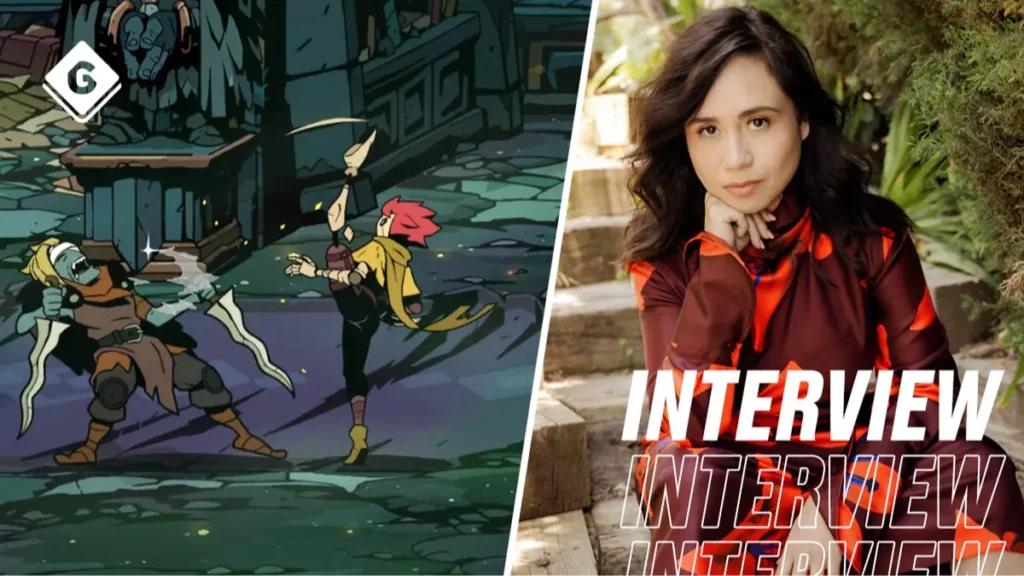
After playing Absolum’s demo at this year’s Summer Game Fest and then the full release when it launched earlier this month, I’ve become enamoured with Dotemu’s roguelike beat-em-up.
If you haven’t played it yet I’d highly recommend it especially if you’re fond of games like Hades II or Dead Cells. To learn more I recently spoke to Samantha Béart, a classically trained actor who stars in Absolum as an unlockable character called Cider, and someone many gamers will recognise for their performance as Karlach in Baldur’s Gate 3.
I spoke to Samantha about their performance in Absolum in addition to their passion for the game industry, much of which shines through their podcast, It Takes A Village, which will soon return for a second season of chats with industry professionals.
Starting off with Samantha’s work on Absolum I wanted to know what initially attracted them to the world. Absolum is about a kingdom that has the magic ripped away from it by the evil Sun King Azra, who outlaws its influence and imprisons those that wield it.
Samantha said: “I received a casting notice and was asked to audition and I thought, ‘cool, side-scrolling beat-em-up, haven’t been in one of those before.’ When I was a kid, I loved Golden Axe and Streets of Rage and that sort of thing though I didn’t love pumping 50ps into the [machine]!”
Samantha then praised the game’s narrative, saying “it’s just a very rich story, which you don’t expect in that genre.”
In the game Samantha plays Cider, who’s unlocked not long into your playthrough and is just one of four characters that make up the game’s roster. According to Samantha, Cider’s backstory is “an interesting mystery” and one you’ll unravel as you progress through the game.
Physically speaking Cider is a mechanical being akin to a clockwork soldier. “They were created by somebody else, and here they are in the world with their telescopic arms, punching bad people in the face, which seemed pretty cool,” said Samantha.

The world of Absolum is an interesting one. As Samantha said earlier in my interview with them a beat-em-up roguelite isn’t the type of genre you’d usually pair with a deep story, while the emphasis of the player’s experience is on the gameplay rather than their characters and performances the passion is still there to see and hear.
This got me wondering what the difference is between just providing your voice for a role, and more physical performances such as Samantha’s time in Baldur’s Gate 3 and doing theatre work.
“Baldur’s Gate 3 had full motion capture, so it was very physical” began Samantha, “if they’re only capturing the voice, it doesn’t matter what you do with your body, right? You just make whatever shape you have to make to get that sound out. We’ve seen some very prolific people in space doing that. Robin Williams, as the genie, is always one that sticks in my head.
“But in games, it’s very broad, and because of NDA culture, you don’t always know what you’re actually going to be doing. So, you might walk into a full-motion video, you might walk into a full motion capture … there’s all sorts of things to think about, so I think in the last, I guess, decade, it’s requiring more skills from the actors and I’d just be very cautious if I was someone going in just as a voice actor, because I think you’re really limiting yourself.”
They then explained that the increase in narrative presence in games means actors now need a wider array of skills. “You definitely need sight-reading skills, but to be able to take a text apart and put a character together when you haven’t always got all the information, or when you haven’t always got the time in the room to do that.”
It brought to mind an interesting point about improvisation. We know improvised acting as going off-script for either comedic purposes or when the scene just takes actors in that direction. In Absolum Samantha said they didn’t get to improvise as the team had a set script and idea of Cider as a character, but there was room for interpretation.
“I did the audition, they liked what they heard, and that’s what they wanted, there wasn’t that much time to go back and forth and play and workshop, but that’s the norm.”
Our conversation then moved onto more of a legacy chat. I always like to ask actors what they get to take from a role, whether it be a newfound understanding of something, a life lesson, or something similar.
When asked if there was anything Samantha took from their time with Cider, they said “Gosh, if only I was allowed to deal out justice with my fists. I said this about Karlach as well. That’s interesting, as it’s a sort of a role that I’ve played before, albeit with more storylines.
Samantha then explained how they were part of the localisation for Demon Souls (2020) and how there was no actual dialogue involved, just grunts, shouts and “dying in all the different ways that you can die in a Souls game.”
“With Cider” Samatha continued, “there was obviously a lot more characterisation, more than you’d normally get in that genre.” Unfortunately they couldn’t name anything in particular but they did explain how acting is less about taking from characters and more understanding them, calling it an “exercise of empathy.”
“What would I do in that situation? When the writing’s great, which it normally is, that’s quite an easy question to answer.”
I then asked what it is about india games that Samantha finds so appealing, which is something I covered extensively in the build up to this year’s Gaming BAFTAs. The beauty of indie games, in my opinion, is the way they can exercise creativity better than any other genre, so I was curious to hear what Samantha’s take on their mass appeal was.
Rather than define any differences Samantha instead spoke about how similar indie games are to AAA games, especially in terms of writing, which is an impressive feat given how they usually have smaller budgets and a smaller creative team. Sometimes it’s all a matter of perspective though as Samantha looked back on their work for Baldur’s Gate 3 and said Larian [Studios] will, to their dying breath, say that they’re an indie company.”
We then went on a brief tangent about indie games we’ve been playing recently, where Samantha said at one point in time “I called my Steam Deck the Balatro machine, because that’s all I’d play on it”, to which I replied “don’t get me started…”
What Samantha had been playing recently was a game called Fading Echo, which they star in as the game’s water-wielding protagonist One. You can check out the game on Steam and Samantha praised how transparent the team at New Tales have been about the game’s development.

It Takes A Village
This segued into one of Samantha’s upcoming projects, a second season of their podcast It Takes A Village which you can catch on their YouTube channel. The podcast brings on a variety of game industry guests, from developers to actors and more to talk about the challenges and joys of game development.
Speaking about what it means to provide a connection between gamers and the talented individuals who provide us with games, Samantha said “I think it’s wonderful to be in the position to do it. I don’t like to moan about things, I like to see change, and there was an opportunity to do it myself, in that people were watching me online.”
Samantha spoke about how it helps “foster a little bit of understanding” and in many ways can be “a bit of a career fair.” There are a lot of people that want to work in the game industry but unlike the games we play all the time there are no step-by-step guides on how to be part of the action.
“It’s about co-advocacy, which you can take to any area of your life. The whole idea was to have some friends around you, that’s the message, we’re gonna need them in the future. And I feel that I was right, unfortunately, on that one, looking at the current climate.”
The It Takes A Village audience can ask questions ahead of time which Samantha has found incredibly valuable, as many “go into areas that I’m not aware of, projects that I didn’t find out about, or whatever.
“I just wanted to create a nice little happy place on the internet and foster that conversation, between ourselves and the industry as well. People love behind-the-scenes stuff, you know? … There’s a reason why it’s visual. I want you to see that person. We might have seen them in a credit with 30 minutes of other names but I actually want you to see these people, so it was very important that it was in a visual format as well.”
New episodes of It Takes A Village will be dropping on Samantha’s YouTube channel later this year and you can watch the previous episodes too if you haven’t already.
I’d also highly recommend you go and play Absolum. If you’re a fan of roguelikes it’ll definitely be your cup of tea, and Samantha’s character Cider is ridiculously fun to play as.




This interview with Samantha Béart is an interesting read! It’s great to hear insights about indie games and the collaborative spirit behind projects like Absolum. Looking forward to seeing how the game evolves!
I’m glad you found the interview interesting! Samantha’s perspective really highlights the collaborative spirit in indie game development, which often leads to more innovative and unique experiences. It’s fascinating how community support can significantly impact a game’s success!
Absolutely! It’s fascinating how her insights on collaboration in indie games emphasize the importance of community support. It really sheds light on how teamwork can lead to innovative ideas and unique game experiences.